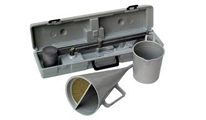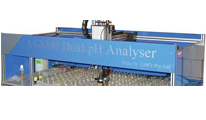QC and laboratory
QC and laboratoryOur main laboratory is located in the office building of the Manufacturing unit in Jodhpur. Relemac india constructed this facility
Onsite Assistance
Onsite AssistanceThis has reference to your letter dated February 1, 2013 regarding the subject mentioned above and the technichal document
Our Advantage
Our AdvantageWhen compared to Bentonite system, the Relemac indiacan operate practically without any special equipment dedicated
Our Mission
Our MissionBased in Delhi, Relemac India is a reputable name engaged as a manufacturer, exporter, and domestic supplier
 Laboratory Facilities
Laboratory Facilities
Our main laboratory is located in the office building of the Manufacturing unit in Jodhpur. Relemac india constructed this facility for the purpose of insuring quality control, expanding research and development, and providing laboratory backup for our drilling fluids engineers working on local projects.
The Mud Lab is a 'built to purpose' facility enjoying the full support of the administration. The design of this facility, facilitates both its use as a laboratory for pilot testing and experimentation, but also is ideally suited to support the in-house mud school. Provided with the latest technology in testing equipment when it was built, the laboratory includes a Fann 75 Viscometer, an Atomic Absorption Spectrophotometer, a Lubricity Tester, a computerized Hot Roll Oven, Heat Fusion equipment, and a Centrifuge among others. In addition, standard mud testing equipment is provided, including a bank of filter presses for multiple sample evaluation. Management considers this laboratory important enough to hire a full time staff to man its operation. Our laboratory manager, is Mr. Andy Philips.
 Quality Control
Quality Control
A quality assurance program is continuously maintained by Relemac india through the services of the laboratory. All reagents and testing chemicals that are required by our field engineers are formulated and standardized at our facility. A complete line of testing equipment and supplies are stocked and maintained by our technicians in the laboratory. To maintain complete assurance and reliability at Relemac india ., both new and used equipment is completely tested and calibrated prior to being allocated to our Engineering Department.
Routine quality control consists of testing our drilling fluids products, such as weight materials, viscosifiers, thinners, polymers, etc., per API specifications or comparisons to industry standards. Oil base muds, brines and completion fluids are also tested and pilot checked prior to leaving our warehouse and mixing plant.
Make-up waters are checked for all physical and chemical constituents prior to spudding a new well. Should an unsuitable water be detected in such a manner, precautionary treatments can then be introduced or the water source changed.Laboratory Facilities
Lab & Field Coordination
Coordination of lab work and field work is achieved through the availability of laboratory services to all technical and engineering personnel on a local 24 hours basis, just as our engineers work. Assistance by laboratory management and technicians is always available should an abnormal condition occur.
During the process of drilling a deep well, with water base mud daily filtrate monitoring can be routine at the laboratory. In a matter of minutes, a complete determination of Cations and Anions can be performed with the aid of a computerized Atomic Adsorption Spectro-photometer and a pH-Ionalyzer.
This is extremely important when drilling with an inhibited mud system. We then provide, on a daily basis, a complete record of all significant Cations and Anions in the system.
In addition, we quite frequently, with the cooperation of the mud loggers and the operator, provide a complete analysis of Cation Exchange Capacities on drilled cuttings from spud to total depth.
Testing Equipment
Complete rheology as well as API and HTHP filtrate analysis can also be conducted by lab personnel in a short period of time. The Fann Model 75 Automatic High Pressure, High Temperature (HPHT) Viscometer uses a newly designed proprietary software for fully automatic control for Pressure, Temperature, and Motor Speed, as well as full manipulation of data for final presentation. The instrument measures rheologies to a maximum of 20,000 psig and 500EF. It allows consistent results and more reliable data due to integrated control of temperature, pressure and motor speed.
 The Fann 75 replaces the FANN 50 (capable of measuring viscosity at up to 500 degrees and 500 psi) with a computerized instrument capable of measuring viscosity at up to 500 degrees and 20,000 psi. The Fann 75 is fully integrated with a personal computer for real time readout and digital data recording. Output can be documented with an onboard graphic display, or exported to other software applications for research and well analysis. This can be an invaluable tool in deeper projects at elevated temperatures and pressures, especially when utilizing oil muds. The ability to measure and record viscosities and gel strengths on a regular basis at bottom hole temperatures and pressures can mean the difference between success and failure. We also have a Malvern Microsizer laser particle size analyzer for solids particle size analysis, an Extreme Pressure Lubricity Meter and a Dynamic HTHP Filter Press.
The Fann 75 replaces the FANN 50 (capable of measuring viscosity at up to 500 degrees and 500 psi) with a computerized instrument capable of measuring viscosity at up to 500 degrees and 20,000 psi. The Fann 75 is fully integrated with a personal computer for real time readout and digital data recording. Output can be documented with an onboard graphic display, or exported to other software applications for research and well analysis. This can be an invaluable tool in deeper projects at elevated temperatures and pressures, especially when utilizing oil muds. The ability to measure and record viscosities and gel strengths on a regular basis at bottom hole temperatures and pressures can mean the difference between success and failure. We also have a Malvern Microsizer laser particle size analyzer for solids particle size analysis, an Extreme Pressure Lubricity Meter and a Dynamic HTHP Filter Press.
Specialized HTHP equipment is available to measure filtrate up to 400 F. This includes dynamic properties where the fluid and cake are dynamically stirred. Computer aided hot rolling aging ovens are available to test muds for prolonged exposure to heat.
 Particle size analysis is important to the long term effects on drilling fluids. Measurements by outside labs take days or weeks and are costly. GEO has purchased a desktop unit from Malvern with a stable single lens optics system. This allows quick setup and ease of measurement of drilling fluids. The unit is operated through a PC shared with the Fann 75. It generates a variety of reports and graphs allowing detailed analysis of the particle size distribution. Measurements are made from 300 to 0.3 microns.
Particle size analysis is important to the long term effects on drilling fluids. Measurements by outside labs take days or weeks and are costly. GEO has purchased a desktop unit from Malvern with a stable single lens optics system. This allows quick setup and ease of measurement of drilling fluids. The unit is operated through a PC shared with the Fann 75. It generates a variety of reports and graphs allowing detailed analysis of the particle size distribution. Measurements are made from 300 to 0.3 microns.
In addition to the above every day duties that are performed in the laboratory, some of the other responsibilities and tests that are routinely carried out are: corrosion coupon analysis, pilot testing, evaluating new products, etc.
Research & Development
Although much of the mud work in the laboratory is routine, the Research and Development group at Relemac india Inc. is very active in the development of new products and techniques. With complete cooperation of management, engineering, and our technical department, many projects are in an active state of development at all times.
An example of the outcome of focused R&D would be the patent awarded to Relemac india Inc. for equipment to dewater waste drilling fluids while drilling. The application of the technology was the culmination of two years of studying the chemistry of recycled drilling waters and fluids.
Due to the importance and invaluable knowledge gained from the study of various complex formations, continuous efforts with the use and availability of such instruments as, Atomic Absorption Spectrophotometer, pH Ionalyzer, X-ray Diffraction, X-ray Fluorescence, and Petrographic Microscope, are being conducted on selected core and shale samples. These analyses are coordinated at GEO’s lab facility for programming appropriate drilling fluids, evaluating comparability of completion mediums, and solving immediate problems encountered on active projects.
Field Support & Electronic Mud Reports
Relemac india. is a full service mud company. Full time mud engineers work as regular employees providing consistency and reliability of service. Many of the engineers are in house trained and all have a wealth of experience in the local area.
API Compliant Daily Drilling Mud Report
One of the key elements to a full service drilling fluids company is the reporting system. Relemac india. utilizes a custom designed Daily Drilling Mud Report which complies with API specifications for field use. This computerized report facilitates data transfer to the final well recap provided to the customer at the end of each well.
The field data collection system is used on a daily basis to save the results of all of the mud tests run by the field engineer. Additionally, much of the rig operation data is also recorded. Typically per the API format all the standard data relating to bits, nozzles, casing, drill string, mud volumes, pump rates, pressures, velocities, etc are reported. The Relemac india Daily Mud Report also has the capability to include torque and drag values, mud logging data, allocation of rig time, directional data. solids control equipment, solids analysis data, and others. Inventory reporting includes all materials used, their unit size and quantity. Customization of the report for special needs, such as mud losses, multiple temperature readings etc is easily made to fit the customer's needs. All parameters can easily be graphed as a function of depth, days, or both.
The report generated for the customer on a daily basis includes all the API standard parameters. In addition, the Hydraulics section includes Critical velocities, Calculated Pressure Loss, Annular Shear Rate at Equivalent Fann RPM, centipoise viscosity .
An integrated case report Sheet using the Driller's Method allows rapid calculations of mud weight, strokes and pressure schedules, immediately when shut in pressures are entered. The daily report can be customized to meet the customer's needs, locating relevant data together and highlighting critical information.
The kill sheet makes certain calculations that compare maximum anticipated casing pressures to fracture pressures, BOPE rating, and casing burst rating to determine if the proposed Well Kill Schedule is safe.
Density Calculation
Working along side this everyday program is the Density Calculation program, which evaluates oil base mud to determine the effective density. Calculations at various depths, taking into account the effects of temperature and pressure on both the oil and the salt water components of the mud. The applications for this specialized output include very deep very hot wells with critical fracture gradient to formation pressure relationships.
Electronic Reporting
Electronic reports, both the Mud Report and the Kill Sheet can be easily converted to a PDF file and E-mailed to any location with Internet access. Where applicable, a remote cellular modem is installed on the mud engineer's computer to allow instant access to the home office, and to allow transmittal of various reports to the customer.
At the end of a well, the electronic mud report is sent to the Bakersfield office where it is entered into the master database. This is used to generate a recap of the daily mud properties and events for the entire well. In addition, this database provides a resource for researching upcoming work. With over 11,000 wells nearly every part of California is well covered.
Our Projects

The unique nature of near surface site specific geology coupled with the diversity of the markets we serve are hallmark challenges faced within Relemac India.
Quick Enquiry